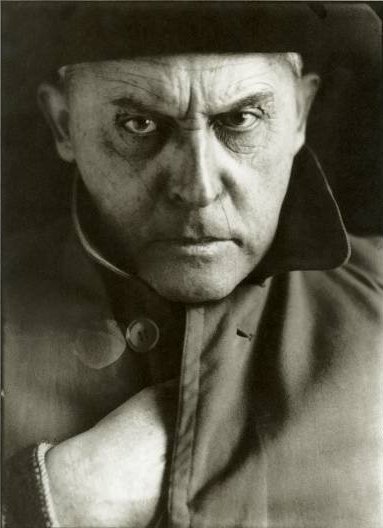He was an avant-garde artist at first, seeking new means of expression, but in time he became a catastrophist, who predicted the dawn of a totalitarian world. He started creating when independence returned, he stopped when it was lost again.
Witkacy dramatically ended his life along with the independent Poland. He committed suicide in September 1939, but not upon the news of the German invasion, but on September 17th, when the Red Army attacked from the east. He saw his world ending before his eyes and he didn’t want to live in the one that was to come. The world that was to come, was the one from his novels, plays, philosophical papers and paintings – a totalitarian world. He feared not only the regime, but also the modern reality that was to follow, a mechanical life in new, total societies led by a mass democracy without a face, loss of personality and independent thought, with soulless people devoid of emotions reduced to nothing but social standards – a world where culture, religion, philosophy and art had no place.
A day after September 17th
At the beginning of September 1939, Witkacy and his friend Czesława Oknińska left Warsaw along with crowds of refugees running from the Germans to the east. They managed to reach Brześć by train, where Witkacy tried to enlist in the army, which, as it turned out, was impossible due to his age (he was 54 years old). They then marched to Kobryń at the Polesie region, and from there to the Jeziory village, where Witkacy had a friend he met during his time in Russia. There, he intended to wait out the beginning of the war. On September 17th, they learned about Russia’s invasion on Poland. On the following day, at dawn both he and Czesława decided to commit suicide.
Witkacy knew Russia. He got there already at the beginning of the First World War, after a long, exotic journey to the Antipodes, Australia and other Oceanic islands, where he went with his friend Bronisław Malinowski, who later became a famous ethnologist. He decided to enlist in the Russian army in hopes of freeing at least a small piece of Poland in the course of the war. He served at the Tzar Life-Guard regiment in Petersburg and had to fight against the Austrian troops where some Poles served as well. He was heavily wounded in the battle of the Stochód river. His regiment began the February revolution in 1917 in Petersburg, and later during the Bolshevik revolution in Autumn of the same year Witkacy was supposedly promoted to a commissar by the soldiers from his unit. When the Polish Military Committee started to form, Witkiewicz joined it, but in the middle of 1918 he returned to his homeland.
Read the full text on the IPN's NextStopHistory website.
